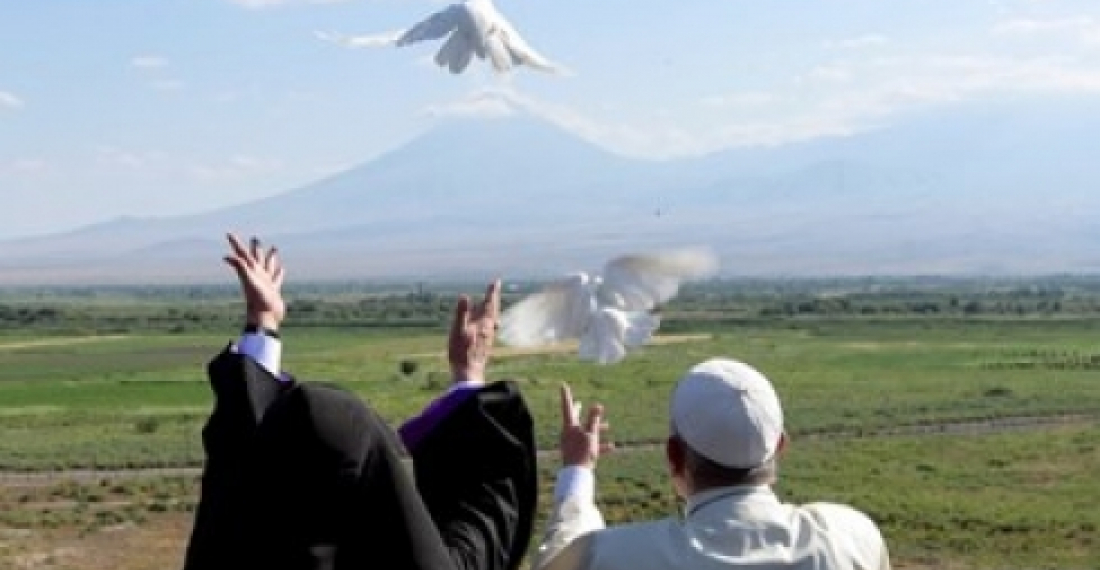Франциск завершил трехдневный визит в Армению, во время которого он призвал к единству между Римско-Католической Церковью и Армянской Апостольской Церковью, и молился за мир, справедливость и примирения во всем мире.
Commonspace.eu освещал визит Папы в прямой текстовой трансляции, который вы можете прочитать здесь
Политический редактор Commonspace.eu подводит итоги визита:
Это был визит главы крупнейшей христианской церкви - Римско-католической церкви, одной из ветвей христианства, по приглашению Армянской Апостольской Церкви, которая отделилась от Рима в пятом веке из-за богословского рассуждения о природе Христа как сына Божьего. Для Папы визит стал в первую очередь частью процесса по примирению и в конечном итоге воссоединения. Эта тема доминировала во время его визита и речей. Конечно, этого не произойдет в ближайшее время, но думаю, что Церкви думаю в более долгосрочной перспективе, чем правительства, поэтому для Папы это был важным шагом в долгосрочной стратегии.
Однако, визит также носил политическое значение для Армении. Запертые в политическом, военном и стратегическом союзе с Россией, особые отношения Армении с Римско-католической церковью представляют возможность поддержания баланса в международных отношениях страны. Франциск продемонстрировал готовность протянуть руку армянскому народу, что выходит далеко за рамки обычной дипломатии Ватикана. В последние три дня он говорил с такими впечатлениями об Армении, о её вере, истории и страданиях. Упоминая массовые убийства армян в Анатолии в 1915 году он использовал слово геноцид, которого не было в подготовленном для него тексте выступления, что, наверное, расстроило некоторых даже среди консервативной дипломатии Ватикана. Ватиканские чиновники в преддверии визита проинформировали СМИ, что Папе, вероятно, нет нужды использовать это слово снова. На это обязательно будет реакция со стороны Турции, хотя может и не такая сильная. Но помимо этого, в Турции обязательно разглядят в словах Папы еще один пример антитурецких настроений в Европе.
Вопрос мира должен был быть другим ключевым элементом визита Папы. Откровенно говоря о нем было сказано очень мало, и многих расстроит то, что папа не использовал более сильный язык говоря о мире на Кавказе.
Однако, в целом для армянской дипломатии этот визит стал огромным успехом. Церковь и государство хорошо сработали в этом случае, чтобы достиь успеха в этом. Значительную роль в этом сыграл посол Армении в Ватикане, Микаэль Минасян. Визит Папы также стал отличным упражнением в работе по освещению визита. Освещение в СМИ в Европе и во всем мире было чуть меньше, чем ожидалось, учитывая новость о brexit, которая доминировала все время визита Папы. Тем не менее, освещение в СМИ в целом порадовало армян.
Для Ватикана визит также стал успешным, хоть за него и придется "заплатить". В конце сентября Папа посетит Азербайджан. Как пройдет этот визит будет видно. Это будет визит другого рода. Азербайджан - мусульманская страна с очень маленькой католической общиной. Но католическая церковь универсальна и не любит, чтобы на карте были пустые места. Поэтому Ватикану придется развить дискурс, который может примирить то, что папа сказал в Ереване с тем, что он захочет сказать в Баку".
источник: commonspace.eu по материалам Радио Ватикана
фото: Франциск и армянский Католикос-Патриарх Гарегин II выпустили белых голубей в направлении Турции под конец визита Папы в Армению 24-26 июня. (Фото любезно предоставлено Радио Ватикана).






